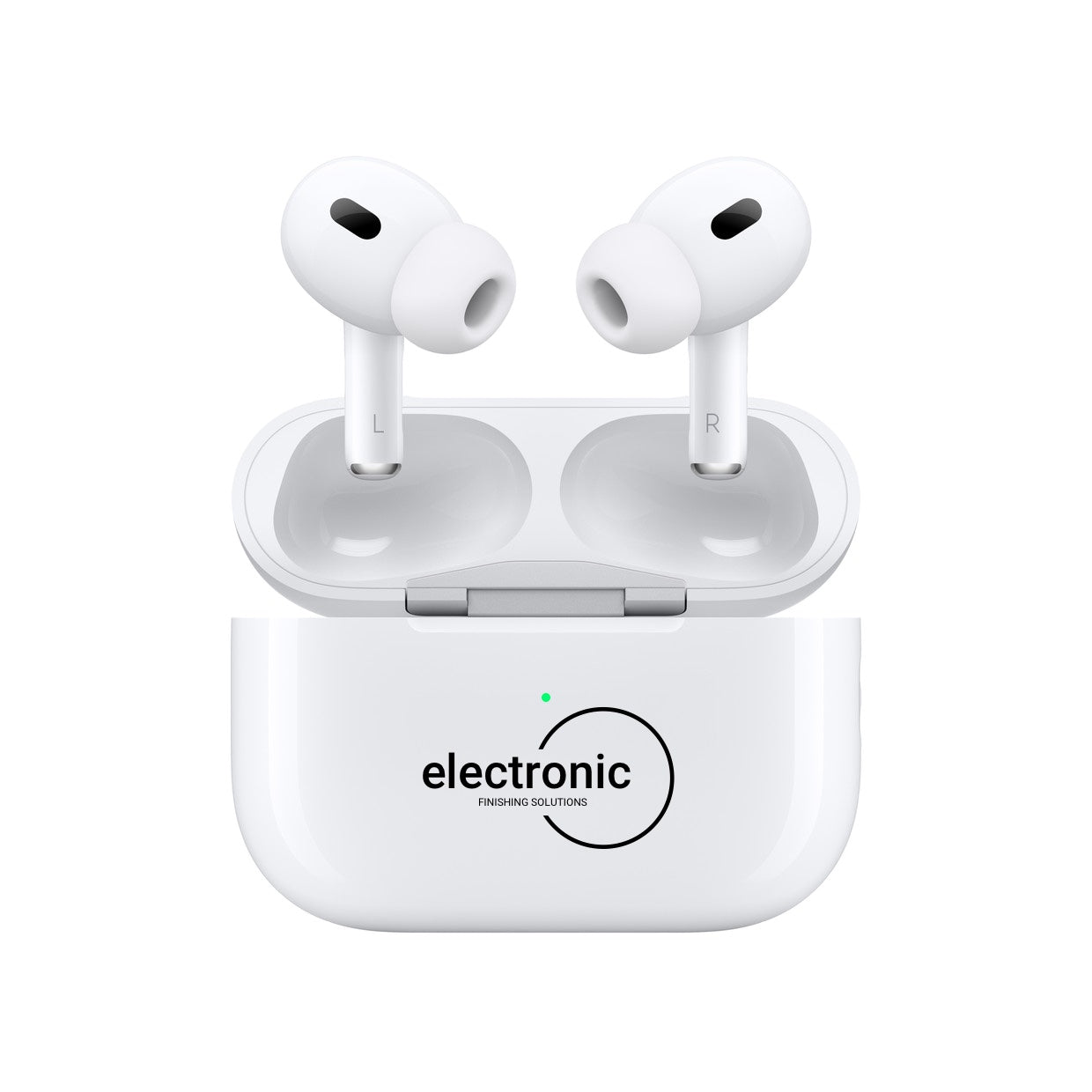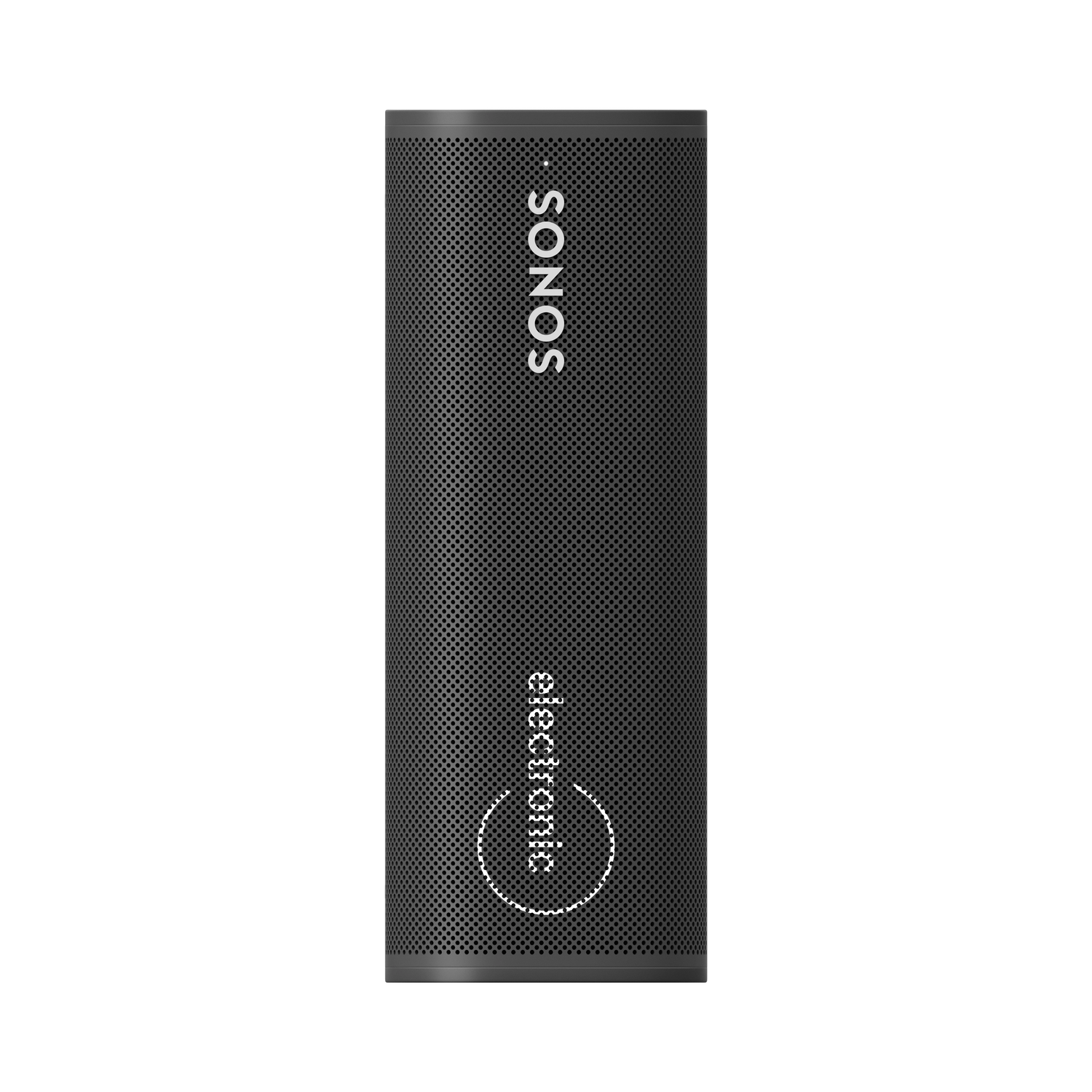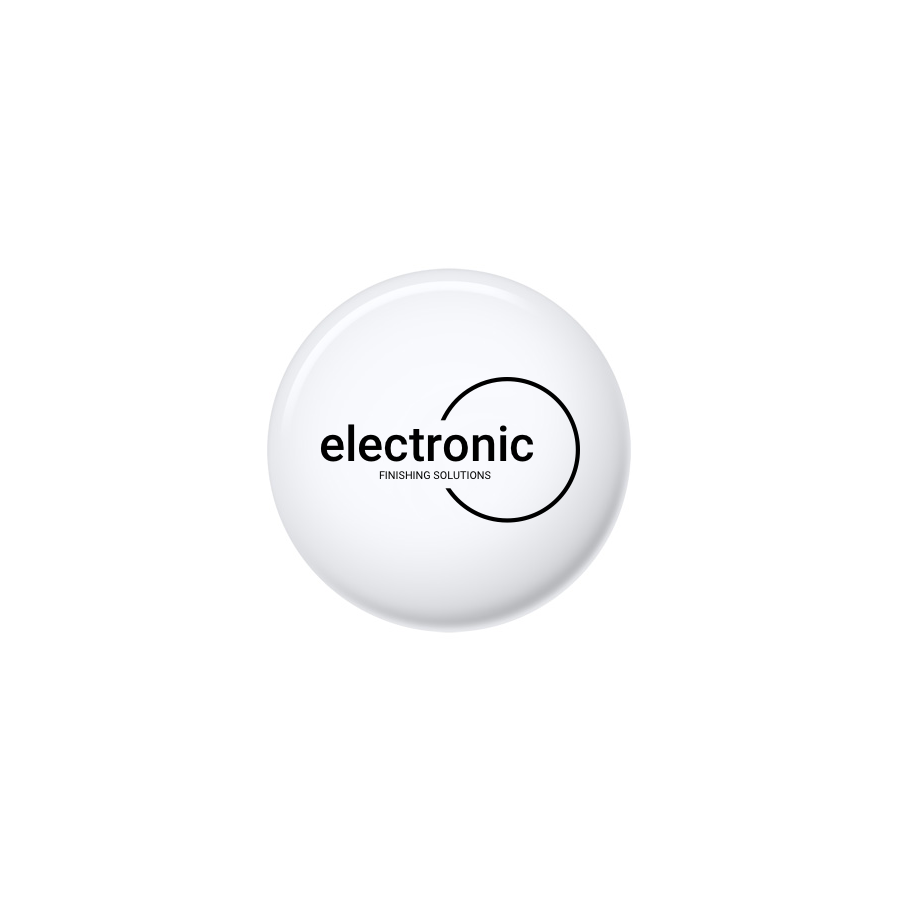Elevate Your Brand with Unforgettable Events
Looking for impactful promotional event ideas to boost brand awareness and drive results in 2025? This listicle presents nine innovative approaches to captivate your target audience and achieve your marketing objectives. From interactive product launches and influencer collaborations to virtual events and experiential activations, discover the perfect format to elevate your brand. Whether a Fortune 100 company or a tech startup, these promotional event ideas will inspire your next marketing campaign.
1. Interactive Product Launch Event
An interactive product launch event is a strategic promotional event idea designed to introduce a new product or service to the market. Unlike traditional presentations, this format combines informative elements with hands-on experiences, allowing attendees to directly interact with the offering. This approach creates buzz, generates media coverage, and provides immediate customer feedback, making it a powerful tool for building anticipation and driving early adoption. This type of event is particularly effective for high-profile product launches aiming to generate significant market impact.
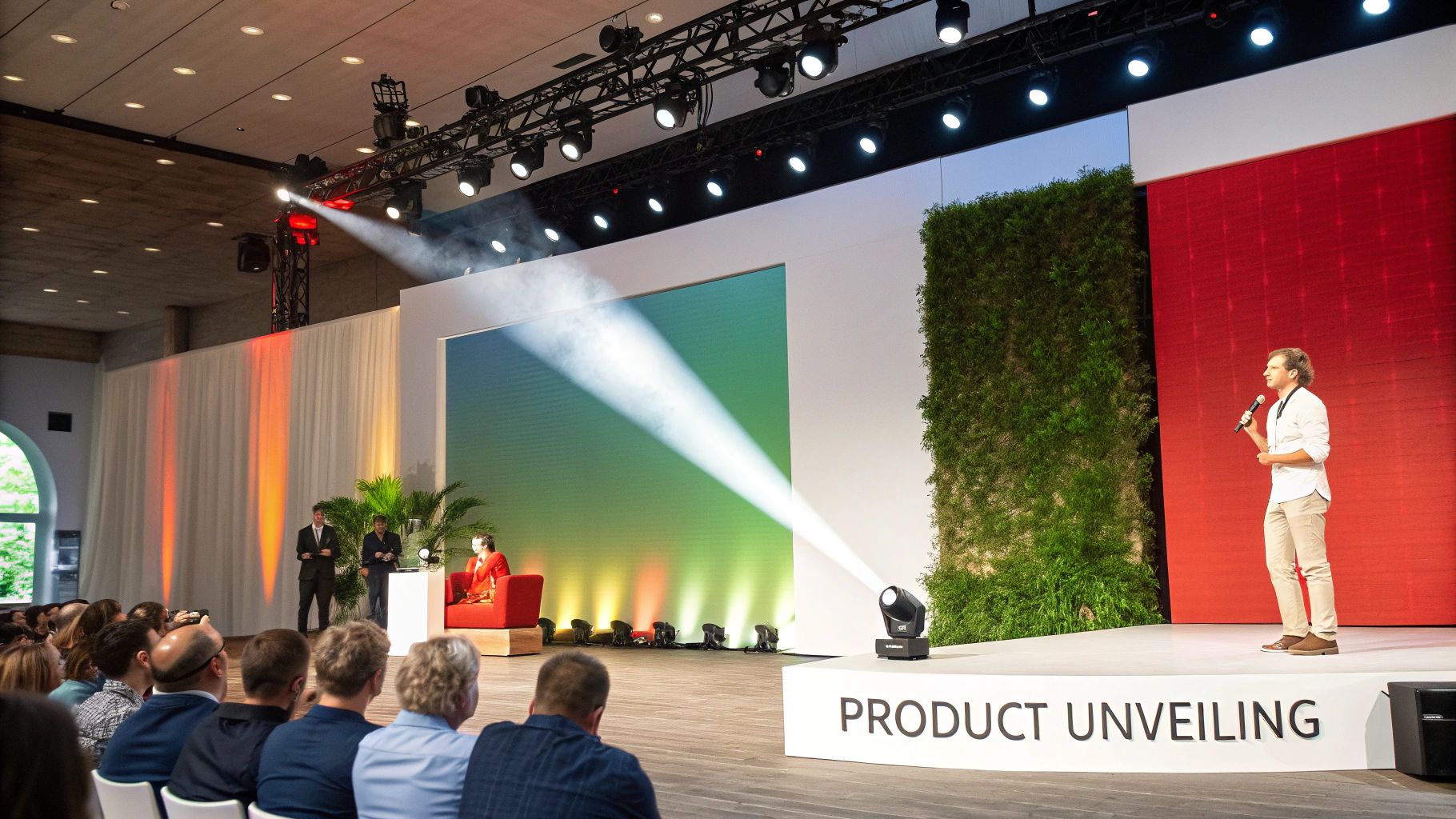
Interactive product launches typically feature live product demonstrations led by experts, hands-on experience stations where attendees can explore the product's features, and Q&A sessions with product developers. Pre-launch teasers and targeted social media campaigns build anticipation, while a dedicated press/media section with exclusive interview opportunities ensures maximum media coverage. This comprehensive approach caters to diverse stakeholders, from potential customers and investors to media professionals and industry influencers.
Examples of Successful Implementation:
- Apple's annual iPhone launch events: These highly anticipated events generate worldwide media coverage and consistently set the standard for product launches.
- Tesla's Cybertruck reveal: Despite a demonstration mishap, the event generated enormous buzz and pre-orders, demonstrating the power of experiential marketing.
- Samsung's Galaxy Unpacked events: These events feature immersive product experiences, allowing attendees to explore the latest Galaxy devices in engaging environments.
- Nike's exclusive sneaker drops: By combining limited availability with experiential marketing, Nike creates a sense of urgency and exclusivity around its product launches.
Pros:
- Creates immediate visibility and excitement for new products.
- Provides valuable first-hand customer feedback.
- Offers significant media coverage opportunities.
- Can generate immediate sales and pre-orders.
- Builds strong brand associations through memorable experiences.
Cons:
- Often requires a significant budget and resources.
- Presents logistical challenges with venue, staffing, and technical requirements.
- Carries the risk of technical failures during demonstrations.
- The pressure to make a strong first impression can cause stress.
Tips for a Successful Interactive Product Launch:
- Craft a compelling narrative: Focus on the product's benefits and how it solves customer problems, rather than simply listing features.
- Incorporate the unexpected: Include surprise elements or guest appearances to make the event memorable and shareable.
- Test everything thoroughly: Ensure all demo equipment and technology are fully functional and tested before the event.
- Leverage influencers: Partner with relevant influencers and early adopters to amplify your message and reach a wider audience.
- Capture high-quality content: Record professional video and photos of the event to extend its reach online and repurpose content for future marketing efforts.
Why This Promotional Event Idea Deserves Its Place on the List: The interactive product launch event stands out as a powerful tool for generating excitement, driving early adoption, and building strong brand associations. Its ability to engage multiple stakeholders simultaneously, generate significant media coverage, and provide invaluable customer feedback makes it an essential consideration for any company launching a new product, particularly for Fortune 100 companies, tech startups, and venture capital firms looking to maximize their return on investment. By creating a truly memorable and engaging experience, an interactive product launch can significantly impact the success of a new product in a competitive market.
2. Pop-Up Shop or Experience
Pop-up shops and experiences offer a dynamic and engaging promotional event idea, injecting a sense of exclusivity and urgency into your marketing strategy. These temporary retail spaces or brand activations appear in high-traffic locations for a limited time, creating buzz and excitement around your brand. Pop-ups allow you to test new markets, products, or concepts without the long-term commitment of a permanent location, providing valuable insights and flexibility. This approach is particularly effective for generating excitement and FOMO (fear of missing out), a key driver in today's fast-paced consumer landscape.
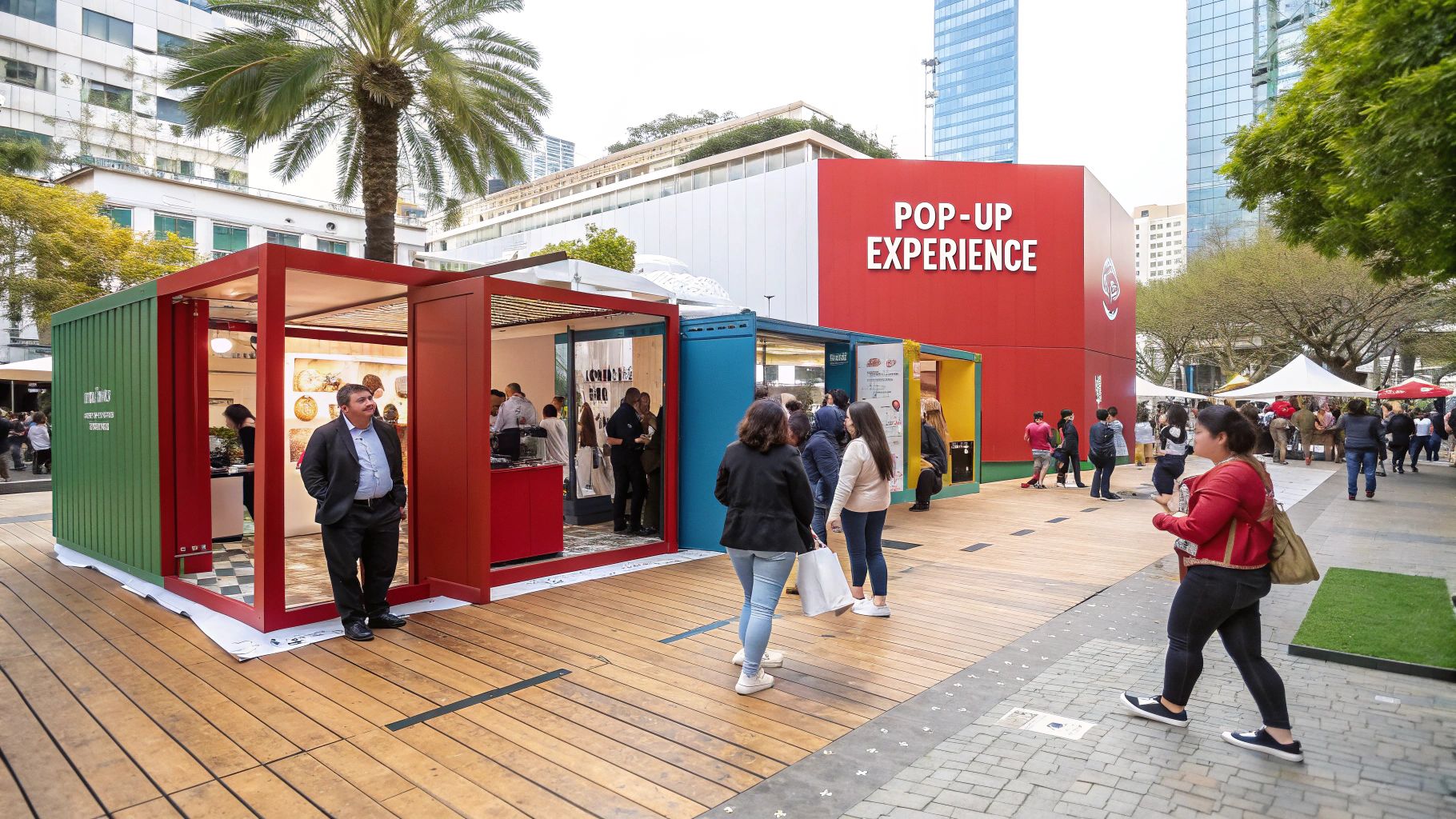
Pop-up experiences are characterized by their limited-time availability (typically days to weeks), unique locations, and exclusive offerings. They often feature highly designed, Instagram-worthy spaces that encourage social sharing and amplify your brand's reach. Interactive elements engaging multiple senses further enhance the experience, creating a memorable and impactful impression on attendees. This makes pop-up shops and experiences a powerful promotional event idea for Fortune 100 companies, tech startups, and corporate marketing teams looking for innovative ways to connect with their target audience. Venture capital firms can also leverage this strategy to boost portfolio companies, and event coordinators can integrate pop-ups into larger events for added engagement.
Successful examples abound, demonstrating the versatility and effectiveness of pop-up events. Glossier's pink-themed pop-ups became social media sensations, while the Museum of Ice Cream's experiential activations attracted celebrities and influencers. Even established brands like Amazon and Louis Vuitton have utilized pop-ups to showcase products, generate buzz, and reach new audiences. Learn more about Pop-Up Shop or Experience for additional insights.
Pros:
- Creates FOMO: Limited availability drives urgency and encourages immediate engagement.
- Lower Risk Market Testing: Experiment with new markets and products without significant financial investment.
- Social Media Amplification: Highly shareable experiences generate organic content and expand reach.
- Audience Expansion: Reach new demographics and geographic areas.
- Creative Brand Presentation: Experiment with innovative and unconventional brand storytelling.
Cons:
- Costly for Short Timeframe: Requires careful budget management to maximize ROI.
- Staffing Challenges: Recruiting, training, and managing temporary staff can be complex.
- Logistical Complexity: Setting up and dismantling the pop-up requires efficient planning.
- Potential Sales Cannibalization: Carefully consider location to avoid impacting sales at permanent locations.
Tips for a Successful Pop-Up:
- Strategic Location: Choose high-traffic areas aligned with your target demographic.
- Instagrammable Moments: Create visually appealing spaces and photo opportunities.
- Data Capture: Implement digital activations to collect customer data and build your audience.
- Thorough Staff Training: Ensure staff is knowledgeable about the pop-up's unique offerings and brand messaging.
- Incentivize Purchases: Offer exclusive items or limited-time discounts to encourage immediate sales.
By carefully planning and executing your pop-up strategy, you can leverage this promotional event idea to generate significant buzz, gather valuable market data, and forge deeper connections with your target audience. It's a powerful tool for driving brand awareness, boosting sales, and creating memorable experiences that resonate with consumers.
3. Influencer Collaboration Event
An Influencer Collaboration Event is a powerful promotional event idea leveraging the reach and credibility of social media personalities or industry experts to amplify your brand message. This strategy involves partnering with influencers who possess a dedicated following to create engaging content, endorse products, or interact live with fans. These events offer a unique blend of authentic engagement and targeted reach, making them a valuable tool for businesses of all sizes, particularly for Fortune 100 companies, tech startups, and corporate marketing teams seeking innovative promotional event ideas.
How it Works: Influencer Collaboration Events center around bringing together relevant influencers and your target audience, often with a specific theme or product launch in mind. This can take many forms, from intimate meet-and-greets and live content creation sessions to large-scale product co-creation projects and multi-platform content distribution strategies. The key is to create an experience that resonates with both the influencers and their followers, generating buzz and driving engagement with your brand.
Features and Benefits:
- Meet and Greet Opportunities: Provide fans with exclusive access to their favorite influencers, fostering a sense of community and loyalty.
- Live Content Creation Sessions: Capture real-time engagement and generate authentic content from multiple perspectives, adding a dynamic element to the event.
- Product Co-creation or Exclusive Collections: Involve influencers in the development process, leading to unique products that resonate with their audience and create a sense of exclusivity.
- Multi-Platform Content Distribution: Extend your reach across various social media channels, maximizing visibility and impact.
- Behind-the-Scenes Access for Followers: Offer exclusive glimpses into the event, fostering a sense of insider access and building anticipation.
Examples of Successful Implementation:
- Revolve Festival (Coachella): This annual event brings together fashion influencers, creating a buzz around the Revolve brand and generating extensive social media coverage.
- Benefit Cosmetics' Influencer Trips: These highly curated trips produce thousands of posts and stories, showcasing Benefit products in exciting and aspirational settings.
- Gymshark's Pop-up Workout Events: Featuring fitness influencers leading workouts and interacting with fans, these events solidify Gymshark's position as a leader in the fitness community.
- Morphe's In-Store Appearances: Beauty influencer appearances often draw massive crowds, demonstrating the power of influencer collaborations to drive offline sales.
Pros:
- Leverages Established Trust: Capitalizes on the pre-existing relationship between influencers and their followers, leading to higher engagement and credibility.
- Creates Authentic Content: Generates diverse content from multiple perspectives, offering a more organic and relatable brand experience.
- Extends Reach to Targeted Audiences: Connects with engaged audiences who are already interested in your niche or industry.
- Provides Social Proof: Third-party endorsements from trusted influencers build credibility and encourage purchase decisions.
- Long-lasting Content: Often generates content that continues to perform long after the event, providing sustained value.
Cons:
- Influencer Fees: Costs can be significant, especially for top-tier personalities.
- Risk of Controversy: Influencer controversies can negatively impact brand reputation.
- Audience Mismatch: Potential for misalignment between the influencer's audience and the brand's target market.
- Measuring ROI: Quantifying the true return on investment can be challenging.
Tips for Success:
- Prioritize Audience Alignment: Select influencers based on audience demographics and interests, not just follower count.
- Clear Contracts: Establish clear contracts outlining content expectations and deliverables.
- Unique Experiences: Provide influencers with unique experiences they wouldn't be able to create on their own.
- Instagrammable Moments: Design the event with visually appealing backdrops and activities in mind.
- Hashtag Strategy: Develop a specific hashtag and content plan to maximize visibility and track campaign performance.
When and Why to Use This Approach: Influencer Collaboration Events are particularly effective for product launches, brand awareness campaigns, and generating excitement around a specific offering. They are ideal for businesses looking to tap into new markets, build credibility, and generate authentic content that resonates with their target audience. This promotional event idea is especially relevant in today's digitally-driven world, where influencer marketing plays a crucial role in consumer behavior. This approach deserves its place on this list due to its proven ability to drive engagement, extend reach, and generate tangible results for businesses aiming to connect with their target demographics in a meaningful way.
4. Virtual or Hybrid Event
In today's interconnected world, virtual and hybrid events have become indispensable promotional event ideas, offering unparalleled reach and engagement opportunities for Fortune 100 companies, tech startups, corporate marketing teams, venture capital firms, and event coordinators alike. These digital or combined digital/in-person events leverage technology to connect with audiences regardless of their location. While initially popularized by the pandemic, virtual and hybrid events have evolved into sophisticated marketing tools, providing advantages that traditional in-person events simply can't match.
What are Virtual and Hybrid Events?
A virtual event takes place entirely online, using platforms like Hopin and Bizzabo to deliver content through live streaming, on-demand videos, and interactive sessions. A hybrid event combines the best of both worlds, offering a core in-person experience supplemented by virtual components, extending the reach to a wider audience.
Why Choose a Virtual or Hybrid Event?
This approach is particularly valuable when aiming for global reach without the logistical and cost constraints of bringing everyone to a single physical location. Think about expanding your audience from a few hundred to potentially hundreds of thousands, as Adobe MAX experienced when transitioning to a free virtual format, increasing attendance from 12,000 to over 500,000. Learn more about Virtual or Hybrid Event They are also exceptionally effective for content that has a longer shelf life. Recordings of sessions can be made available on-demand, continuing to generate value and leads long after the live event concludes.
Features and Benefits:
- Global Reach: Eliminate geographical barriers and connect with a global audience.
- Cost-Effective: Significantly lower cost per attendee compared to physical events.
- Data-Driven Insights: Gather detailed analytics on attendee behavior and engagement for targeted follow-up.
- Evergreen Content: Repurpose recordings for on-demand access and continued lead generation.
- Reduced Environmental Impact: A more sustainable option compared to resource-intensive in-person events.
- Increased Accessibility: Provides greater access for individuals with mobility limitations.
- Interactive Elements: Engage attendees with live polls, Q&A sessions, breakout rooms, and digital networking opportunities.
- Social Media Integration: Amplify your reach and encourage social sharing.
Examples of Successful Implementation:
- Adobe MAX: Transitioned to a free virtual format, dramatically expanding its reach.
- Salesforce Dreamforce: Created a successful hybrid model with exclusive in-person components.
- Peloton: Connects global fitness communities through virtual events.
- Epic Games' Fortnite: Pioneered virtual concerts with artists like Travis Scott and Ariana Grande, reaching millions.
Pros and Cons:
Pros: Global reach, cost-effectiveness, detailed analytics, evergreen content, reduced environmental impact, increased accessibility.
Cons: Potential for "Zoom fatigue," technical challenges, difficulty replicating sensory experiences, requires specialized event planning skills, can lack the organic networking of in-person events.
Actionable Tips for Success:
- Shorter Sessions: Keep virtual sessions concise to maintain attendee attention.
- Regular Interaction: Incorporate interactive elements every 5-10 minutes.
- Multi-Sensory Experience: Consider sending physical materials to key attendees (e.g., branded swag).
- Professional Production: Invest in high-quality audio and video for main presentations.
- Attendee-Generated Content: Encourage attendees to create and share their own content.
- Targeted Follow-Up: Segment your follow-up communication based on attendee behavior and engagement data.
Virtual and hybrid events deserve a prominent place in any promotional strategy. They offer a powerful blend of reach, engagement, and data-driven insights, making them a valuable tool for achieving your marketing objectives in the digital age.
5. Cause Marketing Event
Cause marketing events represent a powerful way to connect with your target audience while simultaneously supporting a worthy cause. This type of promotional event idea aligns your brand with a social cause or charitable organization, demonstrating corporate social responsibility and generating positive brand associations. This resonates particularly well with today's purpose-driven consumers, especially Millennials and Gen Z, who are more likely to support brands that actively contribute to positive social change. This makes cause marketing a valuable addition to any list of promotional event ideas.
How it Works:
Cause marketing events involve partnering with a non-profit organization and integrating a charitable component into your promotional activities. This can include donating a percentage of sales, matching customer donations, or offering volunteer opportunities for employees and customers. These events often include educational elements to raise awareness about the cause and provide tangible impact measurements to ensure transparency.
Features:
- Partnership with established nonprofits: Collaborating with recognized organizations lends credibility and reach to your efforts.
- Donation components: Integrating mechanisms for giving, like percentage-of-sales donations or matching gifts, provides a direct link between consumer action and charitable impact.
- Volunteer opportunities: Engaging employees and customers in volunteer activities strengthens the connection to the cause.
- Educational elements: Informing your audience about the social issue deepens their understanding and motivates further engagement.
- Tangible impact measurements and transparency: Tracking and communicating the results of your efforts demonstrates authenticity and builds trust.
Examples of Successful Implementation:
- TOMS' "One Day Without Shoes": This annual event raises awareness about children's health and education by encouraging people to go a day without shoes, symbolizing the challenges faced by children lacking proper footwear.
- Patagonia's Environmental Activism: Patagonia consistently champions environmental causes through events, grants, and their 1% for the Planet commitment, donating 1% of sales to environmental nonprofits.
- Dove's Real Beauty Workshops: Dove promotes body positivity and self-esteem through workshops and campaigns, challenging unrealistic beauty standards.
- REI's #OptOutside Campaign: REI closes its stores on Black Friday and encourages people to spend the day outdoors, promoting a healthy lifestyle and environmental awareness.
Pros:
- Authentic emotional connections: Cause marketing creates genuine connections with consumers who share your values.
- Positive PR and media coverage: These events often generate positive media attention, enhancing brand visibility.
- High sharing potential: Cause-related content resonates with audiences and is more likely to be shared on social media.
- Improved brand perception and loyalty: Supporting a good cause strengthens brand reputation and fosters customer loyalty.
- Boost employee morale and retention: Engaging employees in meaningful initiatives can boost morale and improve retention rates.
- Potential tax benefits: Depending on the structure of the partnership, there may be tax benefits associated with charitable giving.
Cons:
- Risk of appearing opportunistic: If poorly executed, cause marketing can be perceived as insincere or exploitative.
- Potential controversy: Aligning with a politically charged cause can alienate some segments of your audience.
- Balancing commercial and charitable messages: Finding the right balance between promoting your brand and supporting the cause can be challenging.
- Requires long-term commitment: One-off events are less effective than sustained, long-term partnerships.
Tips for Effective Cause Marketing Events:
- Authentic Alignment: Choose a cause that genuinely aligns with your brand values and resonates with your target audience.
- Focus on Impact: Prioritize the positive impact on the cause over promotional benefits.
- Measurable Goals: Establish clear, measurable goals for both cause impact and business objectives.
- Employee Involvement: Involve employees in the selection and execution of cause partnerships.
- Compelling Storytelling: Document the impact with compelling stories and data to showcase your commitment.
- Long-Term Engagement: Plan for long-term engagement rather than one-off events to build stronger relationships and achieve greater impact.
When and Why to Use This Approach:
Cause marketing is particularly effective when your target audience is passionate about social issues and when you want to build a more purpose-driven brand image. It's an ideal promotional event idea for companies looking to differentiate themselves from competitors, attract and retain talent, and make a positive contribution to society. For Fortune 100 companies, tech startups, corporate marketing teams, venture capital firms, and event coordinators alike, integrating cause marketing into your promotional strategy can deliver significant benefits, both for your business and for the world.
6. Workshop or Educational Event Series
Looking for promotional event ideas that go beyond the typical sales pitch? A workshop or educational event series can be a highly effective strategy for positioning your brand as an industry authority and building deeper relationships with your target audience. This approach focuses on sharing valuable knowledge and practical skills related to your products or industry, fostering trust and demonstrating product value through application rather than direct selling. This makes it a particularly compelling promotional event idea for Fortune 100 companies, tech startups, corporate marketing teams, venture capital firms, and event coordinators looking for engaging and impactful ways to connect with their audience.
How It Works:
Workshops or educational series involve structured learning experiences, often led by experts, offering demonstrations, tutorials, and hands-on opportunities. These events can range from single workshops to multi-session courses, providing participants with valuable skills and actionable insights. The focus is on empowering attendees with knowledge, fostering a sense of community, and subtly showcasing the value of your products or services within a practical context.
Successful Implementations:
- Apple's Today at Apple: Free in-store workshops teach creative skills using Apple products, subtly promoting their capabilities while providing valuable education.
- Home Depot's DIY Workshops: These workshops empower customers with home improvement skills, increasing their confidence and associating Home Depot with practical solutions.
- Williams Sonoma Cooking Classes: These classes utilize high-end cookware while teaching culinary techniques, demonstrating product value in a real-world setting.
- Adobe's Creative Cloud Workshops: Targeted at creative professionals, these workshops demonstrate the power and versatility of Adobe software.
When and Why to Use This Approach:
This strategy is ideal when your target audience values education and expertise. It's particularly effective for:
- Launching new products or features: Demonstrate their value and practical applications.
- Building brand authority: Position your brand as a thought leader and trusted resource.
- Generating qualified leads: Attract individuals genuinely interested in your industry or product category.
- Cultivating customer loyalty: Deepen engagement and build stronger relationships with existing customers.
- Justifying premium pricing: Educate consumers about the quality and value that warrant a higher price point.
Features and Benefits:
- Expert-led instruction: Provides credibility and valuable insights.
- Hands-on learning: Increases engagement and knowledge retention.
- Take-home materials: Extend the learning experience beyond the event.
- Structured curriculum: Ensures a cohesive and comprehensive learning journey.
- Skill development focus: Provides tangible benefits to participants.
- Q&A sessions: Offer personalized guidance and address individual needs.
Pros:
- Establishes brand authority and expertise.
- Creates deeper engagement than traditional promotional events.
- Demonstrates product value through practical application.
- Builds community among participants.
- Generates leads with genuine interest in the category.
- Can justify premium pricing through education about quality differences.
Cons:
- Requires subject matter experts with strong presentation skills.
- More time-intensive for both organizers and participants.
- May attract browsers rather than serious buyers.
- Challenging to scale compared to other promotional formats.
Actionable Tips:
- Focus on solving problems: Address real challenges your customers face, not just product features.
- Tiered content: Offer different levels for varying skill sets (beginner to advanced).
- Capture participant information: Build your database for future nurturing campaigns.
- Valuable take-home materials: Reinforce key learnings and provide ongoing value.
- Gather feedback: Use workshops to collect product feedback and insights.
- Post-workshop communication: Maintain engagement and nurture relationships.
This method, popularized by brands like Lululemon with their in-store yoga classes and REI with their Outdoor School, leverages the power of education to build community and establish strong brand associations. In the digital age, SaaS companies and content marketing pioneers have further demonstrated the value of educational webinars and online workshops as powerful lead generation tools. If you're seeking promotional event ideas that resonate with a discerning audience and generate lasting impact, workshops and educational series are a valuable strategy to consider.
7. Contest or Competition
Contests and competitions are powerful promotional event ideas that leverage friendly competition to drive customer engagement, generate user-generated content, and build a strong sense of community. By structuring challenges around specific submissions, voting mechanisms, or competitive activities, businesses can incentivize participation with prizes, recognition, and the thrill of victory. This approach is particularly effective for Fortune 100 companies, tech startups, corporate marketing teams, venture capital firms, and event coordinators looking to create buzz and gather valuable customer data.
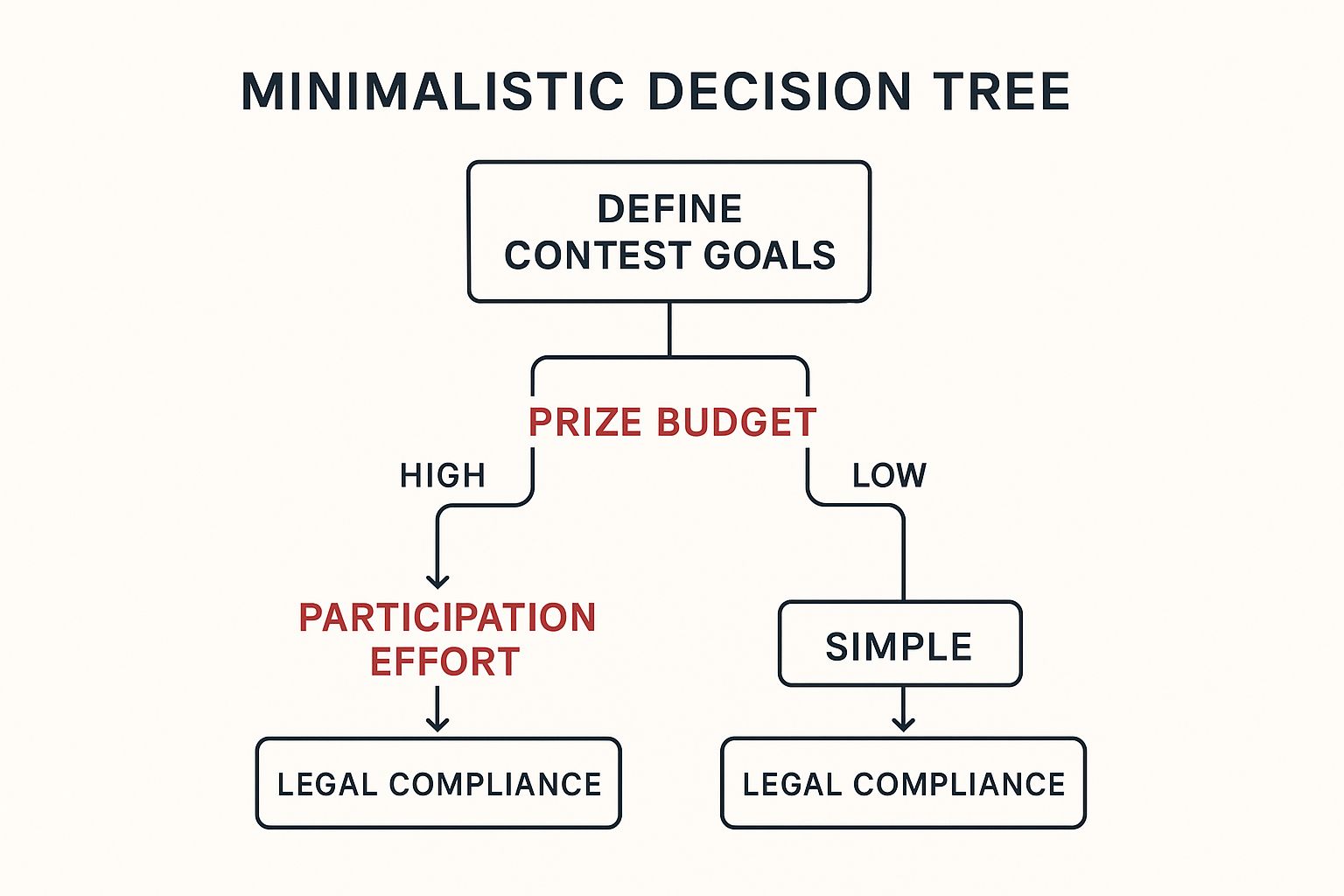
The infographic below presents a decision tree to help you determine if a contest or competition is the right promotional event idea for your specific needs. It visualizes the key decision points and outcomes to consider when planning this type of event.
Successful examples of contests and competitions include Doritos' "Crash the Super Bowl" inviting fan-made commercials, GoPro Awards showcasing user-captured content, Starbucks' White Cup Contest generating custom cup designs, and Lay's "Do Us a Flavor" campaign. These demonstrate the diverse applications of this promotional event idea, from soliciting creative content to driving product innovation.
The following decision tree helps determine if a contest or competition is the right fit for your promotional goals.
Decision 1: Do you want to increase brand engagement and generate user-generated content?
- Yes: Proceed to Decision 2.
- No: A contest or competition might not be the best fit. Consider other promotional event ideas.
Decision 2: Are you prepared to manage the logistical complexities and potential legal requirements of a contest?
- Yes: Proceed to Decision 3.
- No: Consider simpler promotional activities or seek expert advice.
Decision 3: Do you have a clear objective and desired outcome for the contest or competition?
- Yes: A contest or competition is likely a suitable choice. Define your goals and plan accordingly.
- No: Reassess your marketing strategy and define clear objectives before proceeding.
The decision tree emphasizes that while contests can be highly effective, they require careful planning and resource allocation to manage legal complexities and ensure alignment with marketing objectives. Contests are a strong option for engaging customers and gathering user-generated content, but only if the organizer is prepared to handle the associated logistical and legal considerations.
Key Features and Benefits:
- Clear Rules and Judging Criteria: Transparency builds trust and ensures fair competition.
- Compelling Prize Structure: Attractive rewards incentivize participation and generate excitement.
- Public Voting Component: Fosters community engagement and amplifies social sharing.
- Themed Submissions: Aligns user-generated content with brand values and product messaging.
- Multi-Phase Structure: Builds anticipation and extends engagement over a longer period.
Pros:
- Generates excitement and urgency.
- Creates valuable user-generated content.
- Increases social media visibility.
- Collects valuable consumer data.
- Encourages creative product use and demonstrations.
Cons:
- Legal requirements and regulations vary by location.
- Risk of negative sentiment from non-winners.
- Submissions may not meet quality standards.
- Potential for cheating or rule violations.
Tips for Success:
- Showcase your product's best features through the contest mechanics.
- Simplify entry requirements but maintain quality control.
- Utilize multi-round formats to sustain engagement.
- Secure rights to use submitted content in future marketing efforts.
- Establish clear judging criteria and transparent selection processes.
- Create categories to allow different types of participants to win.
When and Why to Use This Approach:
Contests and competitions are ideal for promotional event ideas when you want to:
- Drive customer engagement and brand awareness.
- Generate user-generated content and social buzz.
- Gather consumer insights and product feedback.
- Encourage creative product use and brand advocacy.
This approach has been popularized by user-generated content platforms like Instagram and TikTok, reality TV competition formats, influencer marketing, and brands seeking authentic customer advocacy. By carefully considering the features, benefits, pros, cons, and tips outlined above, businesses can effectively leverage contests and competitions to achieve their promotional goals and connect with their target audience on a deeper level.
8. Experiential Marketing Activation
Experiential marketing activation is a powerful promotional event idea that goes beyond traditional marketing tactics to create immersive brand experiences. It focuses on forging deep emotional connections with consumers through sensory engagement and active participation. These events are designed to create memorable moments that resonate with your target audience, often in unexpected locations or formats, fostering a strong association with your brand. Instead of simply broadcasting a message, experiential marketing invites consumers into the brand story. This approach is particularly effective for promotional event ideas aimed at creating a lasting impact.
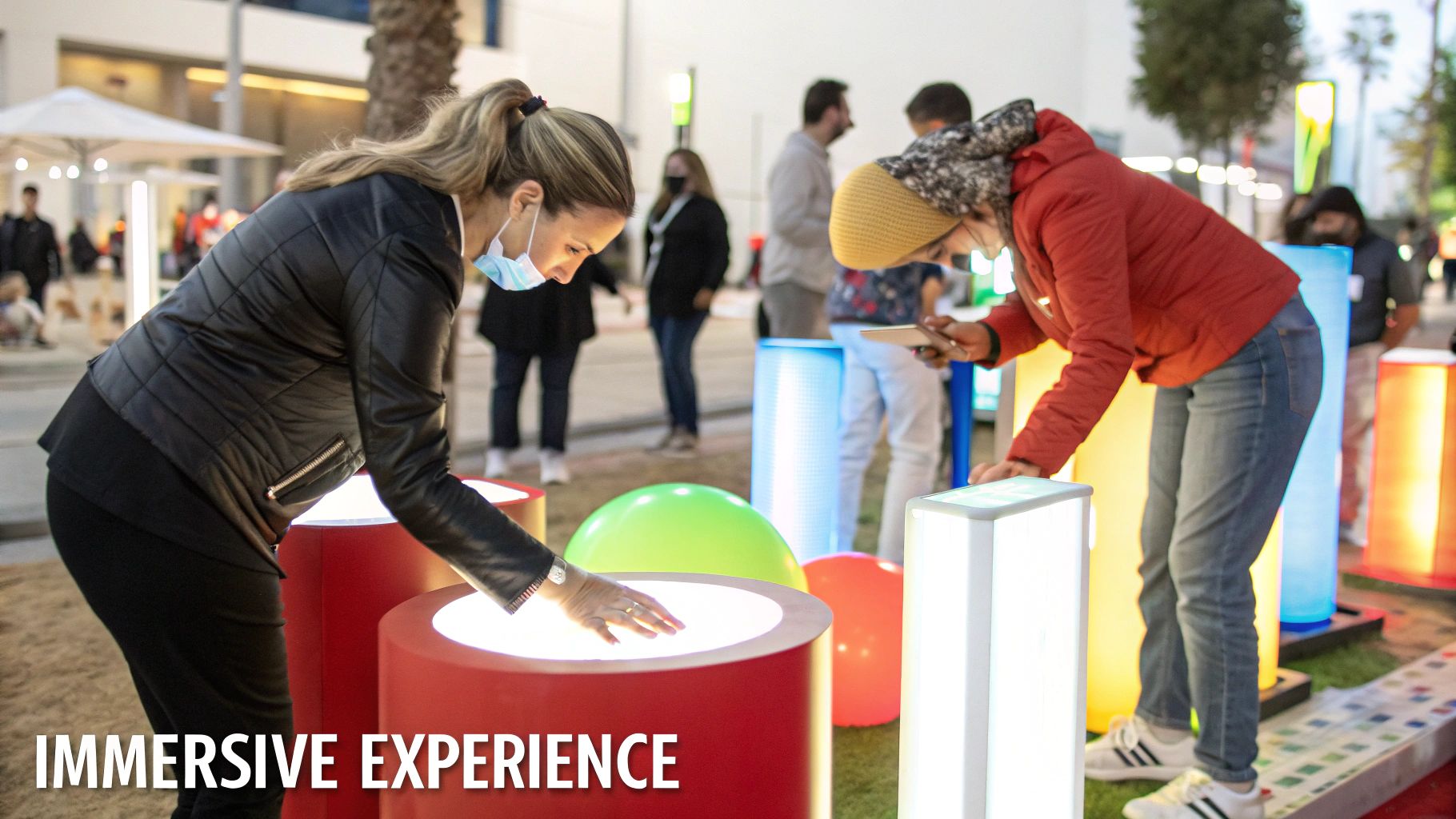
Experiential activations often incorporate multi-sensory elements (sight, sound, touch, taste, smell), interactive installations or environments, compelling storylines, and participatory activities that require active engagement. These elements work together to create shareable moments perfectly suited for social media amplification, generating authentic word-of-mouth marketing. This type of promotional event idea is ideal for companies looking to differentiate themselves and create a buzz.
Successful examples of experiential marketing activations include Red Bull's Stratos space jump, which created an extreme brand experience watched by millions, and Refinery29's 29Rooms, an interactive art installation partnering with multiple brands. Mastercard's "Priceless" experiences, offering exclusive access to unique events, and HBO's Westworld experience at SXSW, recreating the show's immersive environment, are further examples of how this strategy can be used effectively. Learn more about Experiential Marketing Activation. These activations demonstrate the potential of experiential marketing to create impactful and memorable brand engagements.
Tips for Implementing Experiential Marketing Activations:
- Start with emotion: Determine the core emotion you want to evoke in your audience and design the experience backward from there.
- Clear concept: Develop a concise and easily understandable hook or concept that encapsulates the experience.
- Target audience focus: Tailor the experience to a specific target audience rather than attempting to appeal to everyone.
- Thoughtful technology integration: Use technology to enhance the experience without distracting from the core message and interaction.
- Staff training: Invest in thorough staff training, as they are an integral part of the experience and represent your brand.
- Content capture plan: Develop a comprehensive content capture plan with professional documentation to leverage the event across multiple marketing channels.
Pros:
- Creates powerful emotional connections and lasting memory associations.
- Generates authentic word-of-mouth marketing and social media buzz.
- Differentiates your brand from competitors through unique and engaging experiences.
- Provides rich content for multiple marketing channels, extending the reach and impact of the event.
- Can revitalize the perception of established brands and introduce new brands in a compelling way.
- Particularly effective with experience-focused younger consumers (Millennials and Gen Z).
Cons:
- Typically higher cost per impression compared to traditional media.
- Logistically complex and difficult to scale to larger audiences.
- Success depends heavily on flawless execution and attendee engagement.
- ROI can be challenging to measure directly, requiring a focus on qualitative metrics and brand lift.
Experiential marketing activation deserves its place on this list of promotional event ideas because it offers a unique and impactful way to connect with consumers on a deeper level. While traditional advertising methods often struggle to cut through the noise, experiential marketing creates memorable moments that resonate with audiences and foster lasting brand loyalty. This approach is particularly relevant for Fortune 100 companies, tech startups, corporate marketing teams, venture capital firms, and event coordinators looking for innovative and engaging promotional event ideas that deliver measurable results and build brand equity.
9. Exclusive VIP Event
Exclusive VIP events are a powerful promotional event idea, particularly for businesses targeting high-value customers, influential figures, or promising prospects. These invitation-only gatherings cultivate a sense of exclusivity and special access, fostering loyalty and generating aspirational content that resonates with wider audiences. This approach elevates your brand by associating it with prestige and desirability, making it a worthwhile consideration for your next promotional campaign.
How it Works:
VIP events operate on the principle of rewarding key stakeholders with unique, personalized experiences. By offering privileged access, premium amenities, and opportunities for direct engagement with brand representatives, these events solidify relationships and create a buzz that extends beyond the exclusive guest list. The exclusivity itself becomes a form of currency, driving desire and amplifying your brand message.
Features of a VIP Event:
- Strict Guest List: A carefully curated list based on specific criteria (e.g., customer lifetime value, influencer reach, prospect potential). Invitations should be personalized and convey the exclusivity of the event.
- Premium Venue: The location should reflect the high-end nature of the event, whether it's a luxurious hotel, a private club, or a unique venue offering exclusive access.
- Luxury Experiences: Offer special amenities, tailored activities, or curated experiences that align with your brand and resonate with your target audience. Think bespoke cocktails, private performances, or interactive demonstrations.
- Executive Interaction: Facilitate one-on-one time with company executives, creators, or industry leaders, providing guests with valuable insights and networking opportunities.
- Exclusive Reveals: Offer first access to new products, services, or announcements, generating excitement and building anticipation among your most valuable stakeholders.
- Personal Touches: Incorporate personalized gifts, recognition, and thoughtful details that demonstrate your appreciation and solidify the VIP experience.
Examples of Successful Implementation:
- American Express Centurion cardmember events, offering extraordinary access to exclusive experiences and luxury travel opportunities.
- Fashion Week after-parties hosted by designers for their most valuable clients, creating a buzz around their latest collections.
- Rolex's invitation-only previews of new watch collections, building anticipation and reinforcing their brand's prestige.
- Salesforce's Executive Business Forums for C-suite prospects, providing high-level networking and insights into their solutions.
Pros:
- Strengthens relationships with high-value stakeholders
- Creates aspirational content that appeals to a broader audience
- Generates social proof through elite attendee participation
- Allows for personalized, high-touch selling opportunities
- Yields valuable feedback from key customers
- Encourages loyalty through recognition and special treatment
Cons:
- High cost per attendee
- Risk of appearing elitist if messaging isn't carefully managed
- Exclusivity may create negative feelings among non-invited customers
- Logistical complexity of delivering premium experiences
Tips for Success:
- Define clear criteria for the invitation list based on your business objectives.
- Create a pre-event communication journey building anticipation and excitement.
- Incorporate unexpected moments of delight and personal recognition throughout the event.
- Balance structured presentations with networking time for organic relationship building.
- Include a tasteful gifting component that extends the memory of the event.
- Develop a post-event nurturing plan to maintain the relationship momentum.
When and Why to Use This Approach:
VIP events are ideal for:
- Nurturing High-Value Customers: Demonstrate appreciation and solidify loyalty among your most profitable clients.
- Influencer Marketing: Build relationships with key influencers and generate positive brand advocacy.
- Prospecting: Impress potential clients and accelerate the sales cycle through personalized engagement.
- Product Launches: Generate excitement and build buzz by offering exclusive previews to key stakeholders.
Learn more about Exclusive VIP Event
For Fortune 100 companies, tech startups, corporate marketing teams, venture capital firms, and event coordinators, incorporating exclusive VIP events into your promotional event ideas can be a powerful strategy to strengthen relationships, enhance brand image, and drive business growth. By focusing on exclusivity and personalized experiences, you can create truly memorable events that resonate with your most valuable stakeholders.
Promotional Event Ideas Comparison Table
| Event Type | Implementation Complexity 🔄 | Resource Requirements ⚡ | Expected Outcomes 📊 | Ideal Use Cases 💡 | Key Advantages ⭐ |
|---|---|---|---|---|---|
| Interactive Product Launch Event | High - logistics, tech setup, staffing | High - budget, venue, media, influencers | Immediate visibility, media buzz, sales, feedback | New product introductions, brand buzz | Strong brand association, real-time customer feedback |
| Pop-Up Shop or Experience | Medium - setup & teardown in short timeframe | Medium - location rental, temporary staff | FOMO, social sharing, market testing | Testing new markets, limited-time campaigns | Shareable experiences, audience reach |
| Influencer Collaboration Event | Medium - influencer coordination, contracts | Medium - influencer fees, content production | Extended targeted reach, authentic endorsements | Amplifying brand message via influencers | Authentic content, social proof |
| Virtual or Hybrid Event | Medium-High - tech platform, production | Medium - streaming tech, digital content | Global reach, detailed analytics, cost efficiency | Remote/global audience engagement, cost saving | Broad accessibility, data-driven insights |
| Cause Marketing Event | Medium - nonprofit partnership, coordination | Medium - donations, event production | Positive brand perception, emotional connection | CSR-focused campaigns, brand value alignment | Builds loyalty, positive PR, employee engagement |
| Workshop or Educational Event Series | Medium - expert involvement, curriculum planning | Medium - trainers, materials | Deep engagement, trust, lead generation | Education, product demos, relationship building | Establishes authority, community building |
| Contest or Competition | Medium - rules, legal compliance, content management | Medium - prizes, promotion | User-generated content, social engagement, data | Engagement drives, product usage creativity | Builds excitement, content creation, data capture |
| Experiential Marketing Activation | High - immersive design, tech, logistics | High - production, staffing | Emotional brand connections, word-of-mouth | Brand differentiation, memorable campaigns | Unique emotional impact, authentic marketing |
| Exclusive VIP Event | High - strict guest list, luxury setup | High - premium venue, personalization | Loyalty, aspirational content, detailed feedback | High-value client engagement, brand prestige | Personalized experience, elite relationship building |
Making Your Promotional Events Shine in 2025
From interactive product launches and influencer collaborations to virtual experiences and cause-related initiatives, this article has explored a diverse range of promotional event ideas to inspire your 2025 marketing strategy. The most important takeaway is that choosing the right format, tailored to your specific objectives and target audience, is key to maximizing impact. Whether you're a Fortune 100 company, a tech startup, or a venture capital firm looking to make a splash, mastering these promotional event ideas can significantly elevate your brand visibility, generate valuable leads, and ultimately drive business growth. Remember, creating a truly memorable experience strengthens connections with your target audience, fostering brand loyalty and driving long-term success.
By strategically incorporating the concepts outlined here, you can create promotional events that not only achieve immediate goals but also contribute to a lasting positive impression of your brand. These carefully crafted experiences can generate buzz, build anticipation, and solidify your position within the competitive landscape.
Elevate your next promotional event and leave a lasting impression with high-quality, custom-branded electronics from Electronic Finishing Solutions. Their products seamlessly integrate into innovative event strategies, offering a tangible reminder of your brand long after the event concludes. Visit Electronic Finishing Solutions today to discover how their custom electronics can perfectly complement your 2025 promotional event ideas.

